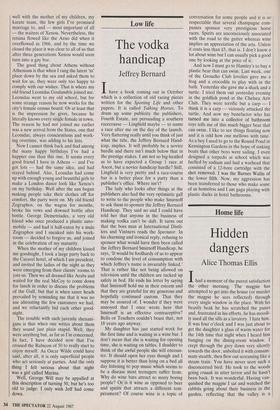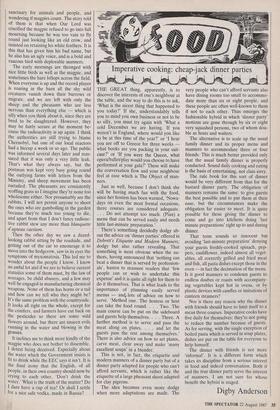Home life
Hidden dangers
Alice Thomas Ellis
Ihad a moment of the purest satisfaction the other morning. The magpie has attempted to get into the house (or murder the magpie he sees reflected) through every single window in the place. With his beastly beak he has scratched the panes and, frustrated in his efforts, he has moodi- ly used all the sills as a lavatory. I hate him. It was four o'clock and I was just about to get the daughter a glass of warm water for the 14th time that night when I heard him banging on the dining-room window. I crept through the grey dawn very silently towards the door, unbolted it with consum- mate stealth, then flew out screaming like a steam train. You have never seen such a disconcerted bird. He took to the woods going craaak in utter terror and he hasn't been back. It was wonderful. Having van- quished the magpie I sat and watched the rabbits going about their business in the garden, reflecting that the valley is a sanctuary for animals and people, and wondering if magpies count. The story told of them is that when Our Lord was crucified the magpie refused to go into full mourning because he was too vain to fly round just looking like an old crow, and insisted on retaining his white feathers. It is this that has given him his bad name, but he also has an ugly voice, and is a bold and raucous bird with deplorable manners.
The early mornings are thronged with nice little birds as well as the magpie, and sometimes the hare lollops across the field. When everyone is up and the record player is roaring in the barn all the shy wild creatures vanish down their burrows or migrate, and we are left with only the sheep and the pheasants who are less nervous than everything else — which is silly when you think about it, since they are bred to be slaughtered. However, they may be fairly secure at the moment be- cause the radioactivity is up again. I think the authorities are still trying to blame Chernobyl, but one of our local reactors had a hiccup a week or so ago. The public was informed several days later and reas- sured that it was only a very little leak. That's what they always say, but the postman was kept very busy going round the outlying farms with letters from the Ministry, and sheep movement has been curtailed. The pheasants are consistently scoffing grass so I imagine they're none too wholesome either. Nor presumably are the rabbits. I will not permit anyone to .shoot the ones who are gambolling in the garden because they're much too young to die, and apart from that I don't fancy radioac- tive rabbit stew any more than blanquette d'agneau caesium.
Then the other day we saw a dazed- looking rabbit sitting by the roadside, and getting out of the car to encourage it to move into the hedgerow, saw in its eyes the symptoms of myxomatosis. This led me to wonder about the people I know. I know an awful lot and if we are to believe current statistics some of them must, by the law of averages, be child abusers, and a few may well be engaged in manufacturing chemical weapons. None of them has horns or a tail and how can we tell who they might be? It's the same problem with the countryside. It looks all right on the whole, except for the conifers, and farmers have cut back on the pesticides so there are some wild flowers around, but there are unseen evils running in the water and blowing in the grasses.
It inclines me to think more kindly of the magpie who does not bother to dissemble. I detest being deceived. Especially about the water which the Government insists is fit to drink while the EEC says it isn't. It is the final irony that the English, of all people, in their own country should now be crying to each other, 'Don't drink the water.' What is the truth of the matter? Do I dare have a cup of tea? Or shall I settle for a nice safe vodka, made in Russia?











































 Previous page
Previous page